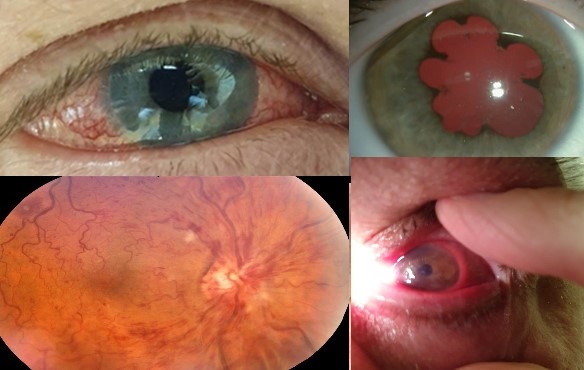The coronavirus disease pandemic (COVID-19) has changed the functioning of all spheres of life, including medicine, and ophthalmology in particular.

Today it is known that coronavirus infection harms the entire human body, and the eyes are no exception. On a monthly basis, Professor Sergey Rykov, Head of the Department of Ophthalmology at the Shupyk National Healthcare University of Ukraine, broadcasts the PROzdorovya, TRK Era, 1 + 1, Emigrantske Radio, and UA Pershiy TV channels live on the Expresso TV channels. "STB", "Zoom", "ICTV", "YouTube" and employees of the Department of Ophthalmology are conducting a number of events to implement the global program to combat blindness "Vision 2020: The Right to Vision.
Patients are consulted live and inform millions of viewers about eye diseases, the latest advances in ophthalmology, new views on the pathogenesis of glaucoma, modern diagnostic methods and new principles of treatment of basic ophthalmo-pathology, and what is especially relevant today – about possible complications of coronavirus infection, methods of emergency diagnosis and treatment protocols.
Consultations on the use of telemedicine are very important today. Implementation of the latest information technologies will help solve the main problem areas of provision of highly specialized ophthalmologic assistance in the regions, which requires priority consideration on ways to reduce the incidence and disability levels due to facial pathology in Ukraine.

Patients usually visit a doctor with a clinical picture of respiratory disease: fever, cough and shortness of breath. Diarrhea often occurs at the beginning of the infection, there is also evidence that SARS-CoV-2 can infect the conjunctiva and cause conjunctivitis, and viral particles are present in the eye secretions. Classic signs of the symptom complex, which may be ophthalmic manifestations during a pandemic: these are conjunctival vascular hyperemia, pain, photophobia, lacrimation, blepharospasm, edema, characteristic discharge, itching. There may also be circulatory disorders in the retinal vessels (especially in patients in intensive care units), decreased accommodation – very often after infection.
If you feel any of these symptoms, you should see a doctor immediately.
You can also learn more about the ophthalmic manifestations of coronavirus infection at trainings and workshops from leading specialists of the Department of Ophthalmology of the Shupyk National Healthcare University of Ukraine, the links of which we will attach below.
See link below: COVID-19 can be infected through the eyes: https://www.youtube.com/watch?v=6RFDvGJqnCg; transmission routes COVID-19: https://www.youtube.com/watch?v=O1QopNNAyvg; ophthalmology and COVID-19: https://www.youtube.com/watch?v=iHJv0bNf8bU; сoronavirus COVID-19; danger 2 waves: https://www.youtube.com/watch?v=2GTlJ4irtyc&t=13s;
сoronavirus COVID-19. Quarantine remote consultation with an ophthalmologist. School online: https://www.youtube.com/watch?v=EHMm0Xv9eZU&t=10710s; viral conjunctivitis: https://www.youtube.com/watch?v=Qo6cRwBHtno; COVID-19 masks and eyes: https://www.youtube.com/watch?v=kRef2FjXczQ.



